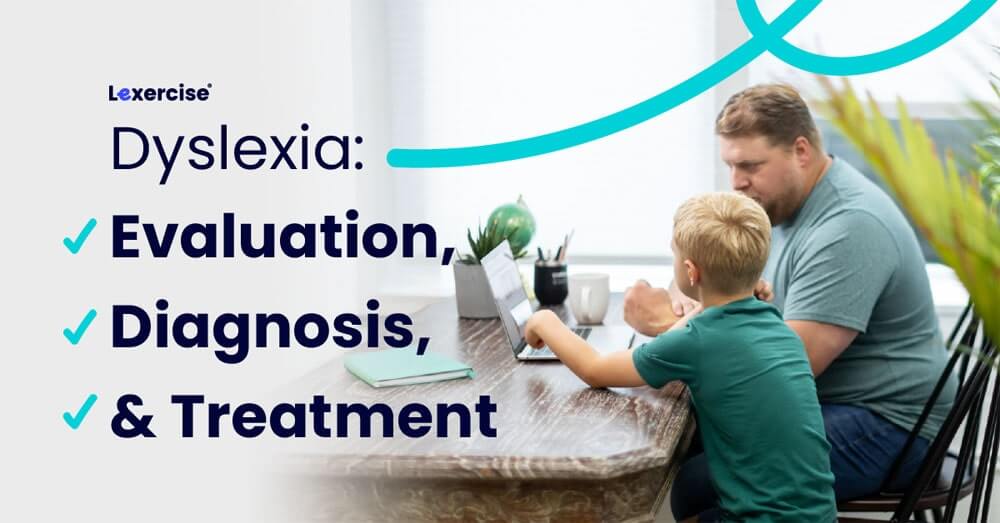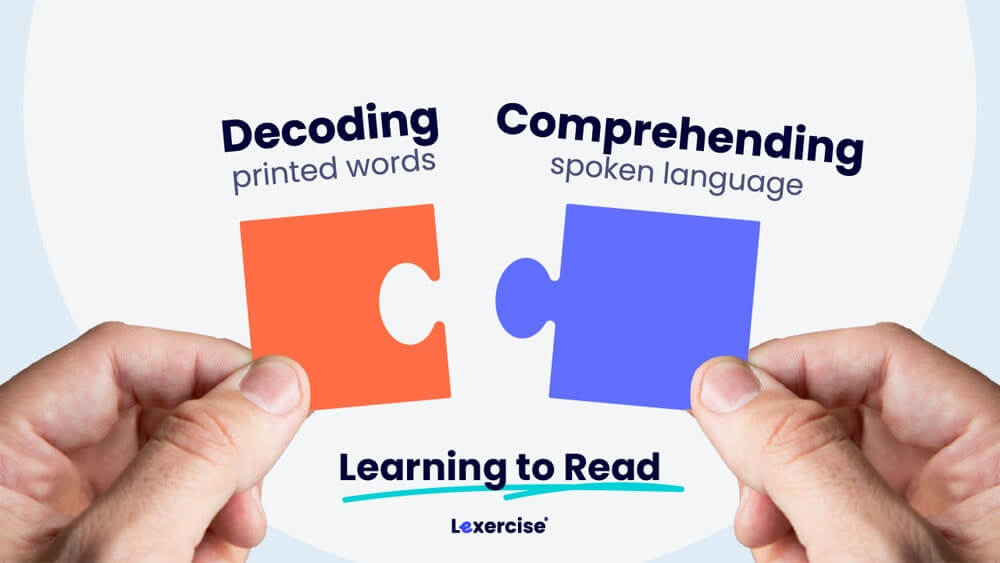Dyslexia: Evaluation, Diagnosis, and Treatment
Written by Sandie Barrie Blackley, Speech-Language Pathologist
Published on May 9, 2025

Dyslexia can be confusing, especially if this is all new to you. There is an enormous body of research pertaining to dyslexia dating back to the late 1800s.
It’s devilishly hard for parents to sort through this avalanche of information to find credible ways to help their child! A good strategy is to look for review articles that summarize the current scientific consensus written by credible professionals. In this blog post, we will share links to some of these credible sources, as well as steps you can take to help your child.
What Dyslexia Looks Like
Dyslexia is a learning difference that mainly affects reading, writing, and spelling, but it exists along a continuum or spectrum, meaning symptoms vary quite a lot from person to person. However, there are clear signs and symptoms that indicate when a child may need professional help:
- Early struggles with letter recognition – Difficulty learning the alphabet, recognizing letters, or matching letters to sounds.
- Persistent reading challenges – Slow, choppy reading with frequent guessing or difficulty sounding out words.
- Trouble with spelling – Misspelling common words and struggling to remember spelling patterns.
- Difficulty with phonics and decoding – Trouble pronouncing written words, breaking words into syllables, or blending sounds.
- Difficulty with writing tasks – Difficulty with written language tasks, possibly including forming letters in a consistent, automatic, and legible manner and persistent reversals of mirror image letters (like -b- and -d-).
- Avoiding reading and writing – Frustration, anxiety, or resistance when it comes to reading or writing-related tasks.

This can be a little confusing because some of these patterns are a normal part of learning to read a write. But the persistence of the patterns longer than 6-12 months is not typical. A child who has these symptoms over an extended period of time is unlikely to outgrow or overcome them without science-based intervention. An assessment by a specialist (such as an educational psychologist or reading expert) can provide clarity and ensure that early reading and writing problems do not become a lifelong disability.
The Importance of an Early Evaluation
There is a reason that humans are the only reading species: Reading requires lightning-fast coordination of a host of complex brain functions. Learning to read rests on a foundation of spoken language skills that are unique to humans. But unlike learning to talk, learning to read generally requires direct instruction. It is no wonder that sorting out the reasons for reading and spelling problems and figuring out what help is needed feels overwhelming and stressful for parents.

By the time a child is in kindergarten, parents or teachers may observe that the child’s reading skills are lagging behind those of peers. In some schools, where systems are in place for identifying and responding to learning challenges, children may be provided with early, targeted reading instruction. This kind of extra help is sometimes referred to as Tier 2 Intervention. For children who are merely weak readers, this assistance may be enough to boost them to grade level. But for children with dyslexia and other language processing disorders, more specialized, individualized treatment is often necessary. This kind of specialized help is sometimes referred to as Tier 3 Intervention.
The first step on the road to successful treatment is often a professional reading and spelling inventory or a formal language-literacy evaluation for three reasons:
- Understanding the problem
- Intervention Planning: developing an individualized approach to treatment that is appropriate to the child’s skills and needs
- Documentation: establishing the child’s eligibility for special public school services and accommodations
Evaluations need to be individualized; it is not something that can be conducted in the classroom with a group of students. Much more than a simple test, evaluation involves gathering detailed background information from parents and teachers and testing a wide range of language, literacy, reading, listening, comprehension, and vocabulary skills appropriate to the child’s age.
In both a professional assessment, like the reading and spelling inventory mentioned above, and a formal evaluation results are provided in a written report that includes all of the data, an initial diagnosis, and a plan for intervention, outlining recommended steps for treatment. The main difference between an assessment or inventory and a formal evaluation is that the latter is more extensive and, thus, can provide a formal diagnosis.
Diagnosing Dyslexia: Who is Qualified?
Professionals who are qualified to test for and diagnose dyslexia include psychologists, speech-language pathologists, and clinical educators. Unfortunately, not all individuals with those titles have the specialized training it takes to administer this kind of testing. To make matters more complicated, some people with no credentials and/or with flat-out misinformation claim that they can diagnose and treat dyslexia.
More and more, qualified clinicians and researchers are basing the diagnosis of dyslexia on a theoretical model called The Simple View of Reading. The Simple View is that there are two main types of reading and writing problems:
- Dyslexia: difficulty processing words, including identifying and pronouncing written words and spelling them.
- Language Impairment: difficulties with comprehension when listening to spoken language, and similar (but perhaps more severe) difficulties when reading.
In the Simple View, dyslexia is not diagnosed with reference to age, grade, or IQ, as it was once proposed. Rather, it’s defined based on patterns of strengths and weaknesses relative to the Simple View.
Since in dyslexia, the deficits are in word identification (decoding) and spelling but not in understanding spoken language, an examiner diagnosing dyslexia must use procedures that allow a clear comparison of the student’s abilities in both areas.

Dyslexia: Common FAQs
Dyslexia is often misunderstood, particularly in terms of how it affects children’s development. Below, we address some of the most common questions we receive from parents interested in learning more about the condition.
Does Dyslexia Affect Speech?
Yes, a history of speech difficulties is more common in children with dyslexia than in typical readers, though not always in the way people expect. Because dyslexia is linked to language processing, some children may struggle with:
- Word retrieval – Difficulty recalling specific words, leading to pauses or substitutions.
- Pronunciation challenges – Mixing up syllables in longer words (e.g., saying “aminal” instead of “animal”).
- Delayed speech development – Some children with dyslexia may begin talking later than their peers.
While dyslexia itself isn’t a speech disorder, speech and language difficulties can sometimes be early signs of dyslexia, making early evaluation important.
Does Computer-Assisted Instruction (CAI) Help Dyslexic Students?
Consensus research demonstrates the benefits of computer-assisted instruction (CAI) for all students in Grades 1-12, including for struggling readers and writers (MacArthur, et al., 2025).
- Reduces handwriting struggles – Dyslexia often comes with difficulties in letter formation and spacing, which keyboarding can alleviate.
- Spell-check and predictive text – Many dyslexic students benefit from digital tools that help with spelling and word choice.
- Voice-to-text technology – Dictation software can allow students to focus on expressing their thoughts without getting stuck on spelling.
While computer-assisted instruction won’t cure dyslexia, it can be an effective instructional tool for improving the quality, productivity, and fluency of writing, as well as academic confidence.
Is Dyslexia Neurodivergent?
Yes, dyslexia is considered a form of neurodivergence. Neurodivergent individuals have brain differences that affect how they process information, learn, and interact with the world. Dyslexia falls into this category because it impacts reading, writing, and language processing in ways that differ from the neurotypical population. However, it’s important to recognize that neurodivergence isn’t necessarily a deficit. Depending on how the individual, the family, the school, and the workplace respond, neurodivergent people can succeed and thrive.
Can You Grow Out of Dyslexia?
No, unfortunately, the idea that dyslexia can be cured is a common dyslexia myth. Dyslexia is a lifelong difference in the way the brain processes language. However, with the right support, individuals with dyslexia can develop strong reading and writing skills over time.
- Early intervention helps – Structured literacy programs can significantly improve reading abilities.
- Coping strategies matter – Dyslexic students benefit from learning the structure of words, including letter formation and how speech sounds and word parts work for pronunciation and spelling. Computer-assisted instruction (CAI) dramatically improves reading and writing proficiency for all students, including students with dyslexia (MacArthur, et al., 2025).
- Challenges may change – While reading fluency may improve, spelling and word retrieval difficulties can persist into adulthood. Technology can help manage these difficulties.
Dyslexia doesn’t go away, but with proper strategies and support, individuals can thrive in school, work, and beyond.
Helping Your Child with Dyslexia
Lexercise is a network of licensed psychologists, speech-language pathologists, and clinical educators with the specialized training required to evaluate and treat dyslexia. We offer the following services:
- A Reading and Spelling Inventory: An online, face-to-face, professional assessment and consultation will help you assess your child’s strengths and weaknesses in reading, writing, and spelling.
- Evaluation: A full online evaluation based on the Simple View that allows the therapist to determine if the student’s performance is characteristic of dyslexia.
- Therapy: We also offer the option to start therapy without a formal diagnosis, with an informal assessment during the first therapy session. You can choose from two of our services, Basic Therapy and Professional Therapy.
- Screening: You can use the free, online Lexercise Dyslexia Screener to get a better understanding of your child’s reading difficulties. We also offer screening for dysgraphia and other learning disabilities.
If you’d like to schedule a free, 15-minute call with one of our expert clinicians, click here. You can also contact us at 1-919-747-4557 or email info@lexercise.com.
Reference
MacArthur, C.A., Graham, S., and Fitzgerald, J, Eds. (2025). Handbook of Writing Research, Third Edition ISBN 9781462557271
Improve Your Child’s Reading
Learn more about Lexercise today.
Schedule a FREE
15-minute consultation


